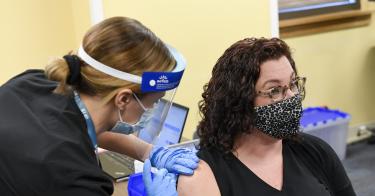In his first prime-time speech as president, Joe Biden stated Thursday night that our nation is in “one of the darkest periods in American history” and “the only way to get our lives back, to get our economy on track, is to beat the virus.”
This also was a common statement made during his campaign. But what does “beat the virus” mean, and what if the coronavirus is now endemic—as some scientists suggest? When will we know we have won?
Biden declared in his speech that small groups maybe could meet on July Fourth if we all do our part, but not larger gatherings. With those words, he ended any hope that Americans would retake their freedom—freedom that so many fought and died for—and return to normal by Independence Day.
Americans were supposed to be safer after a year suffering through the COVID-19 pandemic, a time replete with often contradictory public health declarations, government mandates, and executive orders. But the government’s passion for public safety has become the Achilles’ heel of our personal liberty.
Public health officials seem trapped inside a self-made COVID-19 bubble. With the support of a fawning media, too many are prone to blame and bully the public, instead of the virus, for our conditions. Politicians and business leaders are told they must continue to follow their often contradictory but restrictive public health guidelines, regardless of whether the data or the scientific evidence supports such prescriptions.
Obsessed with the virus, public health officials seem unable to balance protecting the public from the virus and other valuable social goods. Those social goods include Americans’ quality of life, children’s education, the economic survival of small businesses and their workers, and the need to refocus on mental and physical health problems induced by chronic isolation, among other issues.
President Biden has one thing right—“the details of life matter.”
To beat the virus, the president also said we must “follow the scientists and the science.” OK, so let us follow the science.
A recent report from the Centers for Disease Control and Prevention on mask mandates indicates the impact isn’t significant compared with areas without such a mandate. With 2,123 counties out of 3,142 U.S. counties employing a mandate from March through December 2020, mask mandates accounted for a decrease of less than 2% in the number of COVID-19 cases and deaths.
Couple this CDC finding with continued changing advice on the use of masks and other failed measures, and there is legitimate public concern surrounding continuation of other restrictions. The price: a dangerous erosion of trust in the public health system.
Science requires constant evaluation and reevaluation as new data and variables, such as vaccinations and reduced hospitalizations, emerge. Public officials should adjust their policies to match the conditions on the ground.
But the Centers for Disease Control and Prevention also has some explaining to do. The CDC guidelines require mask and distancing requirements beyond the global standards with little if any evidence that this expanded set of rules makes a significant difference.
The global experience, marked by different approaches in different countries, shows that much of the COVID-19 mitigation science is subjective. The result: Americans live under more oppressive pandemic restrictions than many other countries around the world.
Consider CDC’s advice amid the vaccine rollout. Instead of trusting the efficacy of the vaccines and allowing vaccinated Americans to return to normal activities—the norm for past vaccinations—the agency released a complicated set of guidelines for vaccinated adults as a “first step towards normalcy.”
Nonessential travel, including visiting low-risk individuals such as family outside your local area, still is not recommended. The guidance for being out in public places has not changed.
Clearly, what is not “normal” is a further ratcheting down of Americans’ personal freedom and ability to make choices for themselves.
The latest tool of social control is the proposal for a vaccine passport. This could turn out to be a complex and potentially invasive and dangerous path to obtaining private health information. Americans should be rightly concerned with the ethical implications and legal consequences of such an intrusive requirement.
As the nation sees improvement in the COVID-19 case numbers and hospitalizations, several governors and local officials are returning personal and economic freedom to the people.
Public health is critical, but that means health in all of its dimensions. Indeed, health is a holistic concept. The World Health Organization, for all of its past errors, has got this right: Health is not merely the absence of illness or infirmity, but a state of complete physical, mental, and social well-being.
Government officials should strike a balance to ensure the public’s health is supported. This is not March 2020. It is March 2021. Public officials should act like it.
The public is now educated as to what the virus is and who its chief victims are (the elderly and the infirm), and most understand the risk to themselves and others.
This piece originally appeared in The Daily Signal.



